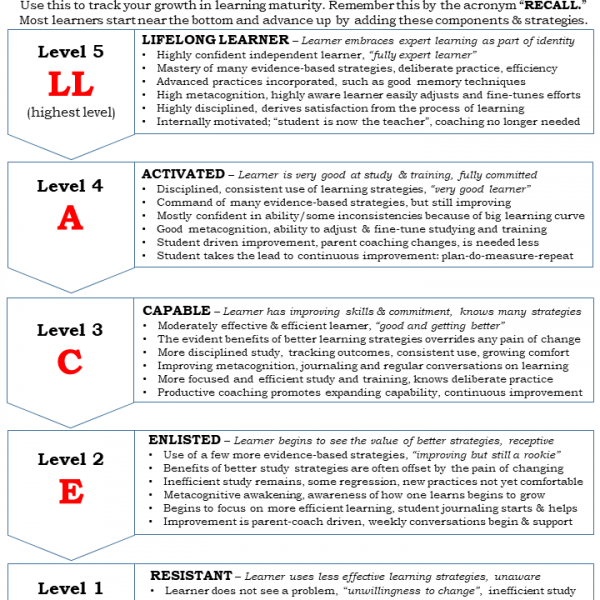
The First Steps to Coaching Conversations

Reading time: 8 minutes
Use this model to guide your first discussions on planned study strategy improvement with your child.
The Need for Parent Coaching
Homeschooling parents often ask why we emphasize the importance of parent coaching for learning. I understand the underlying concern – you are already very busy with the many demands of both homeschooling and parenting. So – why add this to the long list?
Because coaching is necessary to grow the lifelong skills that are harder to learn, and the ones that creates real breakthroughs. And it is not something that is hard to learn.
As parents you are already serving as a coach, whether you thought about it this way or not. You are not being asked to learn something new. Instead, you are thinking about how you can help your child learn better in new ways and a less directive manner. Why should you do this?
Because coaches help people achieve things they didn’t think they were capable of. Think about this reality – if someone really wants to get much better at something, they get a coach. We readily accept the fact that it’s hard to improve your tennis game, or golf game, or soccer skills, or become better at the piano without one. So why not for expert learning?
Coaches help us see and conquer the things that are holding us back. They create new mindsets. They bring another useful point of view to how we are performing. They push us in ways we can’t find on our own. This is what you do for your child as a coach.
Observation of the real world reveals that for many endeavors, like weekend sports, most people learn and practice and then at some point reach a point of competence where they become comfortable – but also stuck. Then, regardless of how much they practice by themselves, they just can’t get any better. This is also true for many hobbies – and interestingly careers. What’s missing – why does this happen? The person doesn’t have a coach to push them to the next level. This same insight applies to creating lifelong learners.
Most children can, over time, get pretty good at independent study on their own, but then they too reach a point where it is difficult, or impossible, to get better. And while this happens, more difficult subjects lie in the future to overload the stalled learner. Don’t wait until this happens to start helping your child.
This is where your parent coaching comes in. You can help your child develop and use much better learning strategies the ones proven to be much more effective, and efficient. As a coach, you provide the ideas and encouragement necessary to get to the next level. Your coaching will provide motivation, planning, and performance feedback. As a coach, you share ideas on methods and technique, and encourage practicing new strategies until they become habits. Over time you can help move your child to a whole new level of performance.
This gets back to the first point. You already coach, so why not learn how to do it much better? Good coaches have expertise and know how to use proven tools and methods. This coaching model is your starting point to becoming a more skillful coach. You will only get better through practice. Follow the behavioral steps, don’t take shortcuts, and you will find that, with practice, you can really “up your game” as a coach.
This coaching model is explored in detail in the Pa 100 course – Coaching Kids through Powerful Conversations on Learning and Thinking. CLICK HERE to sign up for it today!
The Steps for the First Coaching Conversation
Remember you must earn the right to coach before this meeting.
1. Opening – the Opportunity
- Connecting at a different level
- Use coaching demeanor, posture, body language, slow your speech
- Share your Opportunity Statement with your child
- Reassure that you are “Opportunity Finding” (not problem-solving)
2. Sharing and Explaining provide information and ideas
- Share Information – your insights about learning strategies
- Provide your assessment of strengths and areas to improve – use the LSA
- Ask and Listen to your child’s goals and concerns
3. Exploring Possibilities – do not push for solutions
- Ask open questions – keep your child thinking and talking
- Explore mutual ideas for a great future
- Assessing Desire – your child’s feelings, thoughts and fears
- Encouraging – visit the possibilities and benefits to your child’s future
4. Identify the First Opportunities to Improve
- Exploring where to begin and maintain emphasis on improvement
- List and Evaluate ideas
- Encourage – speak to the possibilities – think “WIIFMC”
- Explore “affect” – how your child feels about the potential change
5. Agree to use of new Study Strategies and habits
- Securing Commitment – strategies, how used, regular meetings
- Assess Desire – Ask and Listen how your child feels about the plan
- Clarify agreement and mutual roles – for both student and you the coach
- Secure Commitment to your plan and the parent coaching relationship
6. Encouraging and Enabling Progress – ongoing
- Connect – how is it going, how do you feel
- Monitor and Restore Desire
- Maintain Commitment – support and coach
- Encourage and Recognize Progress






